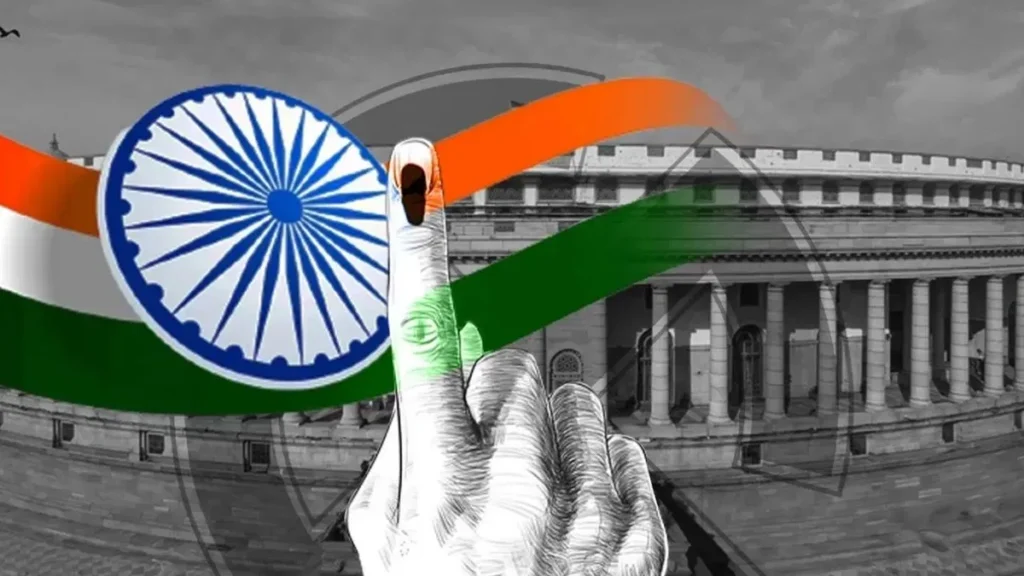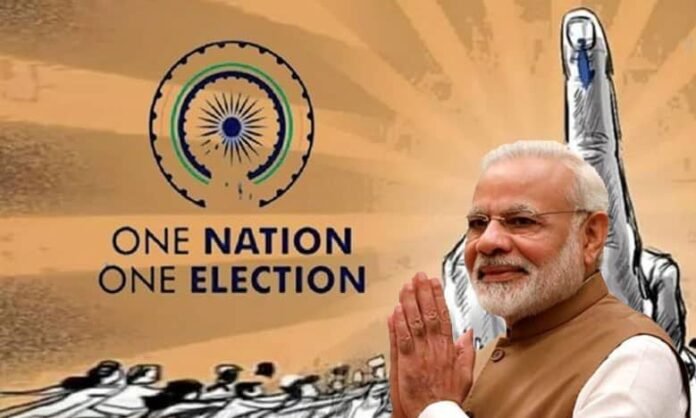One Nation One Election: The central government is going to introduce the ‘One Nation, One Election’ bill in the winter session of Parliament. This bill can be tabled in the Lok Sabha next week. To build a consensus on one country one election, the government also wants to send this bill to the Joint Parliamentary Committee i.e. JPC. If the JPC gives clearance and this bill is passed by both the houses of Parliament, then it will be sent for President Draupadi Murmu’s approval. This bill will become a law as soon as the President signs it. If this happens, then simultaneous elections will be held across the country by 2029.
Table of Contents
Let us know why One Nation One Election is being advocated? What will happen to the assemblies whose term has not been completed? How much will the election process in the country change after the implementation of One Nation One Election:-
What is One Nation One Election?
At present, in India, the state assembly and Lok Sabha elections are held at different times. One Nation One Election means that Lok Sabha and assembly elections should be held simultaneously across the country.
Why does the government want simultaneous elections?
In November 2020, PM Narendra Modi has talked about ‘One Nation One Election’ on many platforms. He has said, “One country one election is not just a topic of discussion, but the need of India. Elections are being held somewhere or the other every few months. This affects development work. If the elections of the Legislative Assemblies and Lok Sabha of the whole country are held simultaneously, then it will reduce the expenditure on elections.
What arguments are being given against this bill?
The opposition is giving many arguments regarding One Nation One Election. Congress argues that if simultaneous elections are held, then there is a possibility of the voters’ decision being influenced. If elections are held once in 5 years, then the government’s accountability towards the public will be reduced.
Which committee was formed to consider One Nation One Election?
A committee was formed on 2 September 2023 under the chairmanship of former President Ram Nath Kovind to consider One Nation One Election. Kovind’s committee has 8 members including Home Minister Amit Shah, former MP Ghulam Nabi Azad, renowned lawyer Harish Salve, Congress leader Adhir Ranjan Chaudhary, former chairman of the 15th Finance Commission NK Singh, political scientist Subhash Kashyap, former Central Vigilance Commissioner (CVC) Sanjay Kothari. Union Law Minister Arjun Ram Meghwal has been made a special member of the committee. The committee submitted its report to President Draupadi Murmu on 14 March. It was approved by the Modi cabinet on 18 September.
What did the Kovind Committee suggest on One Nation One Election?
-The Kovind Committee suggested that the term of all state assemblies be extended till the next Lok Sabha elections i.e. 2029.
-In the first phase, Lok Sabha and Vidhan Sabha elections can be held simultaneously. In the second phase, civic elections can be held within 100 days.
-In case of hung assembly or no confidence motion, fresh elections can be held for the remaining 5 years of the term.
-The Election Commission can prepare a single voter list and voter ID card for Lok Sabha, Vidhan Sabha and local body elections in consultation with the state election officers.
-The Kovind panel has also recommended advance planning of devices, manpower and security force for conducting simultaneous elections.
What did the government say on One Nation One Election?
The government said, “These recommendations of the Kovind Committee will be implemented after the 2029 Lok Sabha elections. After the 2029 Lok Sabha elections, the President will fix a fixed date, so that elections of the states and the center will be held simultaneously. At least 5 to 6 constitutional amendments will be required for this.”
-Union Minister Ashwini Vaishnav said that the Modi Cabinet will send the bill to the JPC to consider the suggestions of the Kovind Committee on One Nation One Election. It will also be discussed across the country. Only after this the next step will be taken.
How was the report prepared?
The committee contacted 62 political parties for this. Out of these, 32 parties supported One Nation One Election. Whereas, 15 parties opposed it. While there were 15 parties who did not give any reply. After 191 days of research, the committee submitted its report to President Draupadi Murmu on March 14. The committee’s report is of 18 thousand 626 pages.
From which countries did the Kovind Committee take which reference?
-For One Nation One Election, the constitutions of many countries were analyzed. The committee studied the election process of Sweden, Japan, Germany, South Africa, Belgium, Philippines, Indonesia.
-In South Africa, elections for Lok Sabha and Vidhan Sabhas will be held in May next year. Whereas Sweden adopts the Proportional Electoral System for the election process.
-Talking about Germany and Japan, here the PM is selected first, then the rest of the elections are held.
-Similarly, in Indonesia too, the elections of the President and Vice President are held together.
Which parties are ready for One Nation One Election?
BJP, Nitish Kumar’s JDU, Telugu Desam Party (TDP), Chirag Paswan’s LJP have supported One Nation One Election. Along with this, Assam Gana Parishad, Mayawati’s Bahujan Samaj Party (BSP) and Shiv Sena (Shinde) faction have also supported One Nation One Election.
Which parties opposed?
The biggest party opposing One Nation One Election is Congress. Apart from this, 15 parties including Samajwadi Party (SP), Aam Aadmi Party (AAP), CPM (CPM) were against it. While 15 parties including Jharkhand Mukti Morcha (JMM), Indian Union Muslim League (IUML) did not give any answer on One Nation One Election.

What will be the process of implementing One Nation One Election?
According to the Law Commission, the proposal of One Nation One Election will also affect Article 328 of the Constitution, for which approval of maximum number of states may have to be taken. According to Article 368(2) of the Constitution, approval of minimum 50% of the states is required for such amendment.
Is it possible to conduct simultaneous elections in the country?
To pass the One Nation One Election in Parliament, the consent of two-thirds of the states will be required. If there is a need to take consent from the rest of the states, then most of the non-BJP governments will oppose it. Many opposition parties have already indicated this. At the same time, even if it is possible to make a law by just getting it passed in Parliament, there can still be many legal problems. The states in which the government has been elected recently will oppose it. They can also go to the Supreme Court regarding the tenure. The differences between the BJP and non-BJP state governments are so much that it does not seem possible that they will reach a consensus on the One Nation One Election.
If One Nation One Election is implemented, which assemblies may have a shorter tenure?
If One Nation One Election is implemented, the current tenure of Uttar Pradesh, Goa, Manipur, Punjab and Uttarakhand will be reduced by 3 to 5 months.
The tenure of Gujarat, Karnataka, Himachal, Meghalaya, Nagaland, Tripura will also be reduced by 13 to 17 months. The current tenure of Assam, Kerala, Tamil Nadu, West Bengal and Puducherry will be reduced.
Has India ever had simultaneous elections?
Yes, it has happened. After India’s independence, Lok Sabha and Assembly elections were held simultaneously in 1952, 1957, 1962 and 1967. However, in 1968 and 1969, the term of several state assemblies was ended prematurely. In 1970, Indira Gandhi suggested dissolving the Lok Sabha even before the completion of its five-year term. With this, she also broke the tradition of holding simultaneous elections in India. While originally the Lok Sabha elections were to be held in 1972. Now the Modi government is trying to implement it again.
What if the Lok Sabha is dissolved before time?
A question arises regarding One Nation One Election that what will happen if the Lok Sabha is dissolved before 5 years? Will there be elections again then? Will the state elections be held again along with the Lok Sabha elections? Till now the Lok Sabha has been dissolved 6 times before 5 years. Once its term was extended for 10 months.
If the governments of the states fall, will there be mid-term elections?
There is also a question regarding One Nation One Election that what will happen if the government of any state falls? Will there be mid-term elections in those states whose governments fall in the middle of their term or not? If not, will there be President’s rule in the remaining period? What will be the process of One Nation One Election in such a case? Answers to these questions are yet to be found. Therefore, the government wants to send this bill to JPC.
Also read:
Why ‘One Nation One Election’ Important? Explaining the Concept and Challenges in Simple Terms

